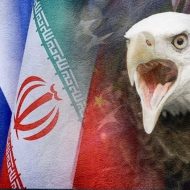Against the backdrop of the coronavirus pandemic, confrontation between China and the US has grown increasingly intense. In this regard, Washington’s wild accusations blaming China for the outbreak will definitely continue, as the US tries to facilitate the withdrawal of production from China to other countries, such as India. Western media outlets claim there is serious danger of Chinese “aggression” against the separatist regime in Taiwan.
Against this background, it is interesting to consider the ideas about confrontation with the US as seen by one of the leading contemporary Chinese military theorists, Chinese People’s Liberation Army (PLA) Air Force major general Qiao Liang (喬良). Qiao is known as an irreconcilable opponent of the United States and author of “Unrestricted Warfare: China’s Master Plan to Destroy America.”
In early May, Qiao Liang appeared in the Chinese media calling on his country “not to dance to the rhythm of the United States”. He argues that recent desperate actions by the US and its deep problems in the fight against the coronavirus demonstrate Washington’s main Achilles’ heel: insufficient production and resources to wage war against an enemy like China. That is why the US is trying to weaken China in advance and strengthen itself by other means.
The United States is unable to wage a long war with China
According to Qiao Liang, “the United States has undisputed high-tech advantages. Therefore, it cannot be ruled out that the United States could fight a high-tech war despite the plague. This sounds quite reasonable, even irrefutable. However, high technology eventually falls back on manufacturing.” Having high-tech Research & Development capabilities does not mean having high-tech capabilities themselves: the realization of whatever has been researched depends on the country’s capacity to actually produce it.
“The final battle is still in manufacturing. Judging from the current status of the shrinking manufacturing industry in the United States, if it wants to wage war against any country today, it will basically be eating its stocks of weapons and equipment. If the United States wants to wage war against the largest manufacturing country in the world when its own manufacturing industry has been hollowed out, with what will it fight? ” the General asks.
According to him, the United States may be strong in science and technology, but it could not produce whatever it develops, and certainly not on a large scale. During the pandemic, the US completely ignored the intellectual property rights of the ventilators they had developed and let other countries produce it, including China – not out of kindness, but because the US was totally unable to produce them on a massive scale themselves – a significant part had to be manufactured in China.
War is production
“Today, the war is still in the manufacturing industry”, Qiao noted.
“It is said that the United States won the First and Second World Wars because of its strong manufacturing industry.[…] But does America still have as strong a manufacturing industry today like it did when it won those wars? After the dollar was cut off from gold half a century ago, the United States gradually profited from a world that was based on the dollar….. Now the US is printing the currency it uses to buy products from all over the world, and the world essentially works for the US – not a problem in itself. But in times of epidemic or war, can a country without production really be considered a strong one?”
The current pandemic is demonstrating the inability of the US to continue to be a superpower.
China, on the other hand, has clearly learned a lot. “We should continue to promote our advantages in this regard. In addition to the advantages of our national system, we also need to promote our learning advantages, be good at learning others, and then learn and apply their advantages,” says Qiao Liang.
He also noted that while the Internet was invented in the US, the Chinese have benefited most from it. At the same time, he argues that no country in the world will be able to replace China as the global factory. Countries such as Vietnam, the Philippines, Bangladesh and India may be cheap substitutes for China’s labour force, but they do not have the same number of skilled and trained workers as China.
Xi Jinping’s China is reviving the spectre of communism, and America is feeling haunted
Dilemma: return of industry or dollar hegemony
In theory, the United States may try to bring production back home as national security demands, but things are not that simple. “The US labor cost is 7 times higher than China’s. How will the company turn a prophet?” Even if there is a government tax cut and the employees automatically cut their wages by half, US fiscal revenue would still be reduced. However, as the Chinese general notes, Americans will not agree to work for low wages, and the attempt to replace people with machines will cause a wave of unemployment. What will they do with the unemployed?
“What’s more, if personal income is halved, consumption will also be halved. How will they boost production? If production does not go up, the GDP will fall, how will the US retain its position as world leader?” the General inquiries.
At the same time, there are forces within the US that will resist the transition from a bubble economy to a real economy. If the US tries to produce everything for itself, “there will be less dollars flowing to other countries, and when other countries trade with each other, they will have to find alternative currencies. Will there still be dollar hegemony? More importantly, the restoration of manufacturing will seriously damage the interests of US financial capital groups. What can Wall Street do? What can the Fed do?” So Trump’s idea of a return of manufacturing to the US directly contradicts the concept of dollar hegemony. Trump has to choose – either the dollar or production.
Sovereignty and the means to protect it
Looking at the example of Taiwan, Qiao Liang demonstrates the idea that sovereignty is now not limited only to territorial sovereignty. Instead of regaining control of Taiwan and restoring China’s territorial sovereignty, Beijing needs to engage in strengthening its sovereignty in other areas. An ill-considered invasion would obviously lead to serious negative consequences for China.
“In today’s world, economic sovereignty, financial sovereignty, cyber sovereignty, defense sovereignty, resource sovereignty, food sovereignty, biological sovereignty, cultural sovereignty, discourse sovereignty, and other aspects of national interest are all part of national sovereignty. Don’t think that only territorial sovereignty is related to the core interests of the country. Other elements of sovereignty are equally vital, sometimes even more-so, and can be questions of life or death”.
At the same time, in the modern world, China needs to learn from the US how to defend its sovereignty “with non-war military operations” following examples such as the 1999 attack on the Chinese embassy in Yugoslavia and the murder of Qassem Soleimani.
Irreplaceable General: Will war in the Middle East follow the death of Soleimani?
The fall of the West
According to Qiao, the new coronavirus pandemic will not cause changes like World War I or II on its own, and it has not changed the international landscape as much as the collapse of the Soviet Union.
However, he believes that external factors are usually only a trigger for change: the internal factor is decisive. “This epidemic is just the last straw for this round of globalization and those behind it” Qiao argues.
If something like the coronavirus had happened in the 1950s and 60s, Europe and the US would not have been so concerned. However, the virtualization of the economy in Europe and the USA has resulted in the necessity of profiting from the exploitation of the labor resources of the Third World, “they have hollowed out their own bodies. This is actually the same reason that ancient Rome gradually went downhill at the end, arrogance and extravagance, and finally the collapse of the empire”.
Western globalization – is already a thing of the past, the general suggests. Western countries are unlikely to recover their industrial production – it’s already too late. The US can continue to make all the accusations it likes against China, ultimately these are just words, whereas China has the technical capacity and strength to back up its convictions.









Leave a Reply